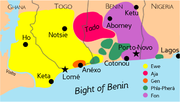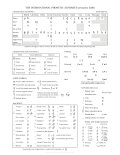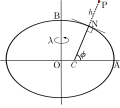Voiceless bilabial fricative (redirect from ɸ)
symbol in the International Phonetic Alphabet that represents this sound is ⟨ɸ⟩, a Latinised form of the Greek letter Phi. Features of the voiceless bilabial...
9 KB (461 words) - 21:23, 8 January 2025
Unicode subscripts and superscripts (redirect from ᶲ)
has several more: Latin/IPA ᶛ ᶜ ᶝ ᶞ ᶟ ᶠ ᶡ ᶢ ᶣ ᶤ ᶥ ᶦ ᶧ ᶨ ᶩ ᶪ ᶫ ᶬ ᶭ ᶮ ᶯ ᶰ ᶱ ᶲ ᶳ ᶴ ᶵ ᶶ ᶷ ᶸ ᶹ ᶺ ᶻ ᶼ ᶽ ᶾ, Greek ᶿ. The Cyrillic Extended-B block contains two...
45 KB (2,863 words) - 01:13, 20 January 2025
In the writing systems of other languages, ⟨f⟩ commonly represents /f/, [ɸ] or /v/. In French orthography, ⟨f⟩ is used to represent /f/. It may also...
15 KB (1,364 words) - 22:36, 3 January 2025
century AD), its pronunciation shifted to a voiceless bilabial fricative ([ɸ]), and by the Byzantine Greek period (c. 4th century AD to 15th century AD)...
13 KB (1,655 words) - 18:55, 17 January 2025
Voiceless linguolabial fricative (redirect from ɸ̺)
symbol in the International Phonetic Alphabet that represents it is ⟨θ̼⟩ or ⟨ɸ̺⟩. Features: Its manner of articulation is fricative, which means it is produced...
1 KB (165 words) - 17:31, 5 December 2024
/ɸ/ has sometimes been transcribed as the cluster /hw/, since, like Japanese, /h/ allophonically labializes into [ɸ] before the high vowel /u/, and /ɸ/...
101 KB (4,431 words) - 05:49, 16 January 2025
No entry sign (🚫), U+1F6AB in Unicode Voiceless bilabial fricative (IPA: ɸ) Phi (Φ and φ), a Greek letter, corresponding to "f" or "ph" Several uses...
3 KB (355 words) - 00:43, 16 January 2025
Greek letter Phonetic letter Uppercase φ phi U+03C6 ɸ U+0278 Voiceless bilabial fricative – γ gamma U+03B3 ɣ U+0263 Voiced velar fricative Ɣ U+0194 ε...
117 KB (9,111 words) - 19:09, 17 January 2025
point x, compute ɸ(x), the gradient direction and r = y – x as shown in the image. Store r as a function of ɸ. Notice that each index of ɸ may have many...
16 KB (2,327 words) - 05:08, 13 November 2024
The table below mentions the different participles present in Hindustani, ɸ denotes the verb root. The aspectual participles can take a few other copulas...
56 KB (6,014 words) - 20:14, 14 January 2025
n (ɲ) (ŋ) (ɴ) Stop p b t d k ɡ Affricate (t͡s) (d͡z) (t͡ɕ) (d͡ʑ) Fricative (ɸ) s z (ɕ) (ʑ) (ç) h Liquid r Semivowel j w Special moras /N/, /Q/...
93 KB (10,748 words) - 22:50, 20 January 2025
[t͡ʃ, d͡ʒ, ʃ, ʒ]. Ewe is one of the few languages known to contrast [f] vs. [ɸ] and [v] vs. [β]. The f and v are stronger than in most languages, [f͈] and...
21 KB (1,964 words) - 15:38, 14 January 2025
phonemes /k/, /t/, /p/ are pronounced between vowels as fricatives [h], [θ], [ɸ] respectively. The sequence /la kasa/ la casa 'the house', for example, is...
10 KB (653 words) - 02:52, 5 November 2024
Letter Small Capital OE U+0277 ɷ 631 Latin Small Letter Closed Omega U+0278 ɸ 632 Latin Small Letter Phi U+0279 ɹ 633 Latin Small Letter Turned R U+027A...
157 KB (1,863 words) - 11:54, 13 January 2025
Phi-Sat-1 (section Follow-up Mission: ɸ-Sat-2)
Phi-Sat-1 (also known as ɸ-Sat-1) is a CubeSat mission from the European Space Agency (ESA) that uses Artificial Intelligence (AI) for Earth observation...
11 KB (774 words) - 14:43, 29 March 2023
aspirates (/pʰ tʰ kʰ/ respectively), developed into the fricatives /f/ (via [ɸ]), /θ/, and /x/. Finally ζ, which is still metrically categorised as a double...
43 KB (4,886 words) - 04:35, 16 January 2025
present in the language, ɸ denotes the verb root. The verb root ɸ for non-complex verbs is a single root however for complex verbs ɸ is in the form of ɸ1...
86 KB (5,150 words) - 13:50, 7 January 2025
approximately as follows: [ɸ] before [i e a] or [j ɾ l] [h] before [o] or [u] [ʍ] or [hɸ] before [w] By early Old Spanish, [ɸ] had been replaced with [h]...
26 KB (2,460 words) - 18:04, 27 December 2024
changes to /t/ (example: beoseot (버섯) 'mushroom'). /h/ may become a bilabial [ɸ] before [o] or [u], a palatal [ç] before [j] or [i], a velar [x] before [ɯ]...
95 KB (8,644 words) - 20:55, 18 January 2025
tamba 'boil'. All consonants other than the prenasalised consonants, /ŋ/, /ɸ/, /h/, and /ʃ/ can be geminated (occur as double consonants), but only between...
50 KB (4,843 words) - 13:13, 18 January 2025
Bilabial fricatives (articulated with both lips): Voiceless bilabial fricative [ɸ] Voiced bilabial fricative [β] Labiodental fricatives (articulated with the...
968 bytes (94 words) - 07:06, 20 December 2024
Australian English. The labiodental fricative /f/ is often pronounced as bilabial [ɸ] after the bilabials /p/, /b/, and /m/, as in up-front GA: [ʌpˈɸɹʌnt], Cub...
66 KB (1,806 words) - 12:39, 23 December 2024
qχ ɢʁ ʡʜ ʡʢ ʔh Sibilant fricative s z ʃ ʒ ʂ ʐ ɕ ʑ Non-sibilant fricative ɸ β f v θ̼ ð̼ θ ð θ̠ ð̠ ɹ̠̊˔ ɹ̠˔ ɻ̊˔ ɻ˔ ç ʝ x ɣ χ ʁ ħ ʕ h ɦ Approximant ʋ ɹ...
2 KB (246 words) - 03:44, 20 October 2024
For example, ⟨e⟩ and ⟨o⟩ for [ɛ] and [ɔ], ⟨t⟩ for [t̪] or [ʈ], ⟨f⟩ for [ɸ], etc. Indeed, in the illustration of Hindi in the IPA Handbook, the letters...
165 KB (16,169 words) - 21:10, 18 January 2025
and Northern Okinawan have no clear isogloss. The pan-Japonic shift of /p > ɸ > h/ can be observed at various stages in Amami–Okinawan. Unlike Northern...
15 KB (1,174 words) - 11:20, 21 December 2024
sometimes read as indicating that such sounds are not possible. The fricatives [ɸ] and [β] are often lateral, but since no language makes a distinction for...
7 KB (436 words) - 11:05, 25 December 2024
qχ ɢʁ ʡʜ ʡʢ ʔh Sibilant fricative s z ʃ ʒ ʂ ʐ ɕ ʑ Non-sibilant fricative ɸ β f v θ̼ ð̼ θ ð θ̠ ð̠ ɹ̠̊˔ ɹ̠˔ ɻ̊˔ ɻ˔ ç ʝ x ɣ χ ʁ ħ ʕ h ɦ Approximant β̞ ʋ...
3 KB (320 words) - 09:02, 26 December 2024
Early Middle Japanese (section /ɸ/)
following vowel, as in Modern Japanese. [citation needed] By the 11th century, /ɸ/ had merged with /w/ between vowels. Syntactically, Early Middle Japanese...
66 KB (4,887 words) - 20:18, 10 January 2025
qχ ɢʁ ʡʜ ʡʢ ʔh Sibilant fricative s z ʃ ʒ ʂ ʐ ɕ ʑ Non-sibilant fricative ɸ β f v θ̼ ð̼ θ ð θ̠ ð̠ ɹ̠̊˔ ɹ̠˔ ɻ̊˔ ɻ˔ ç ʝ x ɣ χ ʁ ħ ʕ h ɦ Approximant ʋ ɹ...
13 KB (170 words) - 03:03, 19 December 2024














